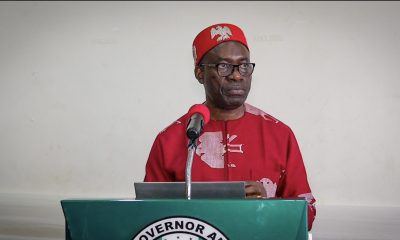Justice Maryann Anenih of the Federal Capital Territory High Court has declined a bail application filed by Yahaya Bello, the former governor of Kogi State, describing the motion as “premature.” Bello, along with two others, faces a trial over an alleged N110 billion money laundering case brought by the Economic and Financial Crimes Commission (EFCC).
Delivering her ruling, Justice Anenih noted that the application, submitted on November 22, was filed before Bello was in custody or formally arraigned. According to the judge, this rendered the application “incompetent.”
During the hearing, Bello’s lead counsel, Joseph Daudu (SAN), argued that his client, a former two-term governor, became aware of the charges through a public summons.
Daudu assured the court that Bello would neither interfere with witnesses nor abscond if granted bail, emphasizing that sufficient grounds had been presented to support the request.
“The court is urged to exercise its discretion judicially and judiciously in granting bail to the 1st defendant,” Daudu pleaded.
Opposing the motion, EFCC prosecutor Kemi Pinheiro contended that the application was procedurally defective since it was submitted prior to Bello’s arraignment. Pinheiro argued that bail applications should be made only after a defendant has been arraigned or presented before the court.
READ ALSO: EFCC arraigns Yahaya Bello on fresh N80.2bn fraud charges
Justice Anenih, in her ruling, referenced the Administration of Criminal Justice Act (ACJA), emphasizing that bail applications are appropriate only after a defendant has been arrested, detained, arraigned, or brought before the court.
She pointed out, “The instant application for bail showed that it was filed on the 22nd of November. This shows that it was filed several days after the 1st defendant was taken into custody.” Bello was reportedly taken into custody on November 26 and arraigned on November 27, making his earlier application premature under the law.
The EFCC accuses Bello and his co-defendants of laundering N110 billion during his tenure as governor. The case has drawn significant public attention due to the gravity of the allegations and Bello’s political prominence.
The court’s decision highlights the procedural requirements that must be met in criminal proceedings, particularly in cases involving high-profile defendants. Bello remains in custody as the trial progresses.

 Comments and Issues1 week ago
Comments and Issues1 week ago
 Comments and Issues1 week ago
Comments and Issues1 week ago
 Comments and Issues7 days ago
Comments and Issues7 days ago
 Health6 days ago
Health6 days ago
 Comments and Issues7 days ago
Comments and Issues7 days ago
 Education7 days ago
Education7 days ago
 News3 days ago
News3 days ago
 Aviation6 days ago
Aviation6 days ago

